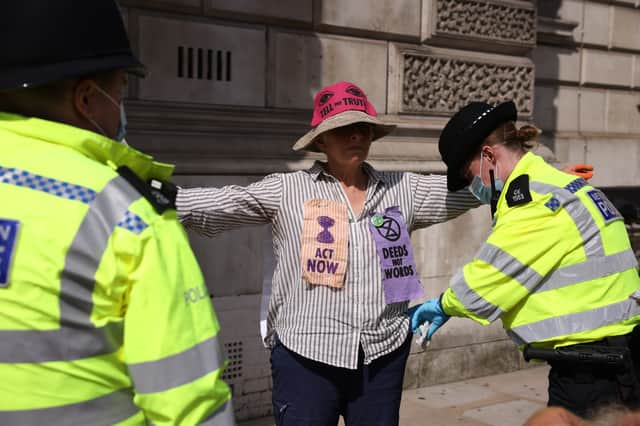Stop-and-search use in Avon and Somerset rose 21% in pandemic - with black people more likely to be stopped


Avon and Somerset Constabulary conducted over 1,500 more stop and searches last year, figures show, though fewer led to an arrest.
Home Office data shows officers in Avon and Somerset used stop and search powers 10,386 times in the year to March – up from 8,555 the year before.
Advertisement
Hide AdAdvertisement
Hide AdDespite this rise, the proportion of searches which led to an arrest fell from 15 per cent to 10 per cent over this period.
Across England and Wales, the number of stop and searches also rose from 577,000 in 2019-20 to 704,000 in 2020-21.
The figures show that across England and Wales, black people were significantly more likely to be searched than white people, though slightly less so than the year before.
In Avon and Somerset, they were 7.6 times more likely to be stopped, compared to 8.4 in 2019-20.
Advertisement
Hide AdAdvertisement
Hide AdMost of all stop and searches in the region were done for drugs - 66 per cent, up from 61 per cent the year before and a record high.
What Avon and Somerset Police say
On the increase in use of the tactic, the force said that during the national lockdown demand had changed and policing adapted, with an increased capacity for more a proactive approach.
A spokesperson added: “The number of people who have been stopped and searched has stabilised as the COVID restrictions have been lifted and police demand has returned to that expected for the time of year.”
On black people being more likely to be stopped, the force admitted ‘the level of disproportionality is still unacceptable’, adding practices continued to be reviewed.
Advertisement
Hide AdAdvertisement
Hide AdA spokesperson said: “The fact that Black people continue to be disproportionately targeted by stop and search powers is an issue we are striving to better understand and address.
“We are conducting a comprehensive review of our information and intelligence processes and improving our first and second line manager scrutiny of stop search, to ensure that officers are using their powers legitimately.”
For context, the force said the disproportion ranged from an area to area with the difference falling in St Paul’s in Bristol, and rising in rural Somerset.
The force, however, is building on findings from the Lammy Review and Cabinet Office Race Disparity Audit of 2017 to improve practices.
Advertisement
Hide AdAdvertisement
Hide AdIt is also increasing scrutiny on the tactic with the creation of a new panel.
What Stopwatch UK say
StopWatch UK said the vast majority of searches cause more problems than they solve.
Habib Kadiri, research and policy manager at the police monitoring organisation, said a fall in arrest rates reflects fears that police-community relations are backsliding.
Mr Kadiri added: “What is exceptional is how racial disparities persisted even during a global pandemic, proving that the police never stopped working tirelessly to overpolice people of colour.
Advertisement
Hide AdAdvertisement
Hide Ad“We simply would not accept this of any other emergency service profession. The police must do better.”
What the Home Office says
The Home Office said police used extra officers and resources to tackle drug crime during the coronavirus lockdown, and also removed almost 16,000 dangerous weapons from our streets.
A spokesman added: “No one should be targeted for stop and search because of their race and there are extensive safeguards in place to prevent this.”
